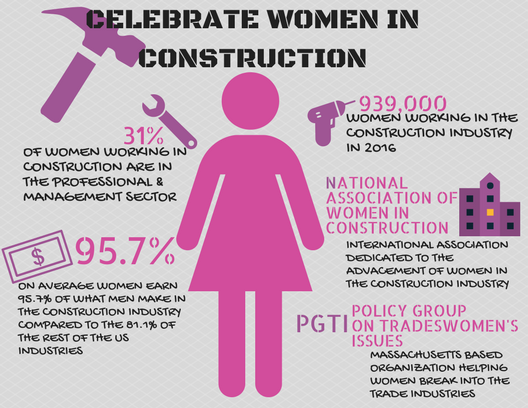
Celebrating Women in Construction: Women In Construction Week
I am a woman in construction, sort of. Until earlier this week I will shamefully admit that I had no idea what Women in Construction Week was. Unbeknownst to me, the NAWIC and organizations across the country celebrate and honor women in the construction industry annually. This year we’re highlighting the women in construction from March 4-10, 2018.
Who Are the Women In Construction
The National Association of Women In Construction (NAWIC) is an international organization dedicated to the advancement of women in the construction industry. Their purpose is to promote and encourage women to break barriers and seek employment and education in the predominately male construction industry. The NAWIC works to encourage equality in the construction field and aids in bringing awareness to female issues within the construction industry. Among other feats, the NAWIC’s core purpose is ensuring success for women in construction. The NAWIC list of core values and code of professionalism is empowering, uplifting and encouraging not just to women in the construction industry, but for women in any profession.
The statistics are staggering.
According to information gathered by the Bureau of Labor Statistics, females in the construction industry make up only 1.3% of the entire US workforce (2015). Of the construction field, women make up a small 9.1% of the 10,328,000 workers nationwide. Amongst the somewhat dim stats, there is a shining light. The construction industry seems to be paving the way as far as income equality. Women earn 95.7% (average) of what men do as compared to the rest of the workforce (81.1%).
The NAWIC has grown to over 5,500 women members with more than 160 local chapters. Since its inception in 1953, the NAWIC has created a scholarship foundation so support women education in the construction field and became an international organization with affiliations in Australia, New Zealand, South Africa, United Kingdom and Canada.
Breaking Ground-Literally!
Rosie the Riveter was introduced in World War II to inspire women to enter the workforce for the first time. She encouraged women to break through gender boundaries and take on new roles in the modern world. She was an icon, literally and figuratively, and although her relevance has since dwindled her message still holds true for the construction and trade industries.
Women are still the minority in the trade workforce, however, organizations like PGTI (The Policy Group on Tradeswomen’s Issues) are working to change the statistics. The Massachusetts based organization collaborates with tradeswomen, unions, contractors, government reps and community organizations to provide information, education and opportunity to increase the percentage of tradeswomen in the workforce.
The PGTI is working diligently to increase and retain women in the trades by educating not only the women working in the trades, but also those hiring trades and those influencing trades. Their goal is to open doors to educated tradeswomen in the construction industry to break down the stagnant barrier of gender inequality in the field. They offer resources, hold meetings, set hiring goals and target construction projects to slowly but surely change the way the industry employs women.
Similar to the ideals of Rosie the Riveter (although not as archaic), the PGTI motivates and encourages women to enter a field they would otherwise consider to be unreachable. Their mantra and the way they begin each meeting speaks to their efforts far better than I could: “We are in this together. There is no silver bullet. We will never, never give up.”
Women in Construction Week
As this year’s WIC week comes to a close, these organizations and the women working in the construction industry are changing our perceptions of women in the workforce, especially when it comes to the male dominated construction industry. Our obligation this week and everyday is to support the efforts and honor those who have and continue to break ground for these women.
Learn more about the NAWIC- http://www.nawic.org/nawic/default.asp
Learn more about the PGTI- https://policygroupontradeswomen.org/about-pgti/about/
Want to see more from us, read our blogs! www.mrgcm.com/blog

